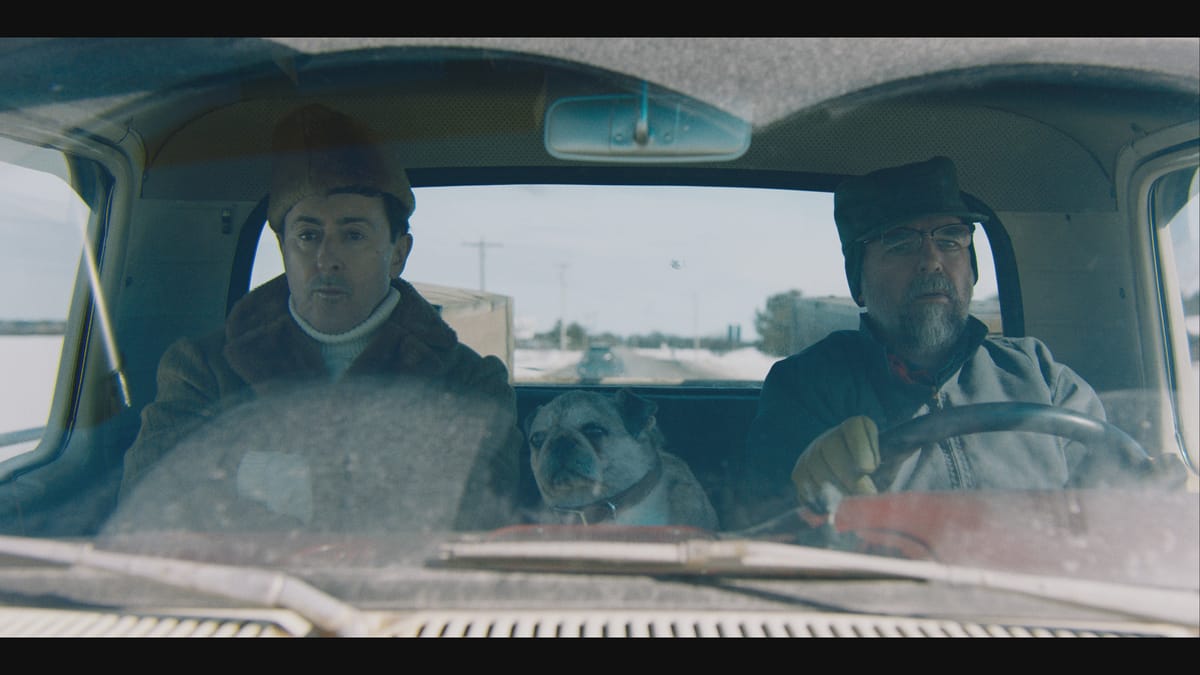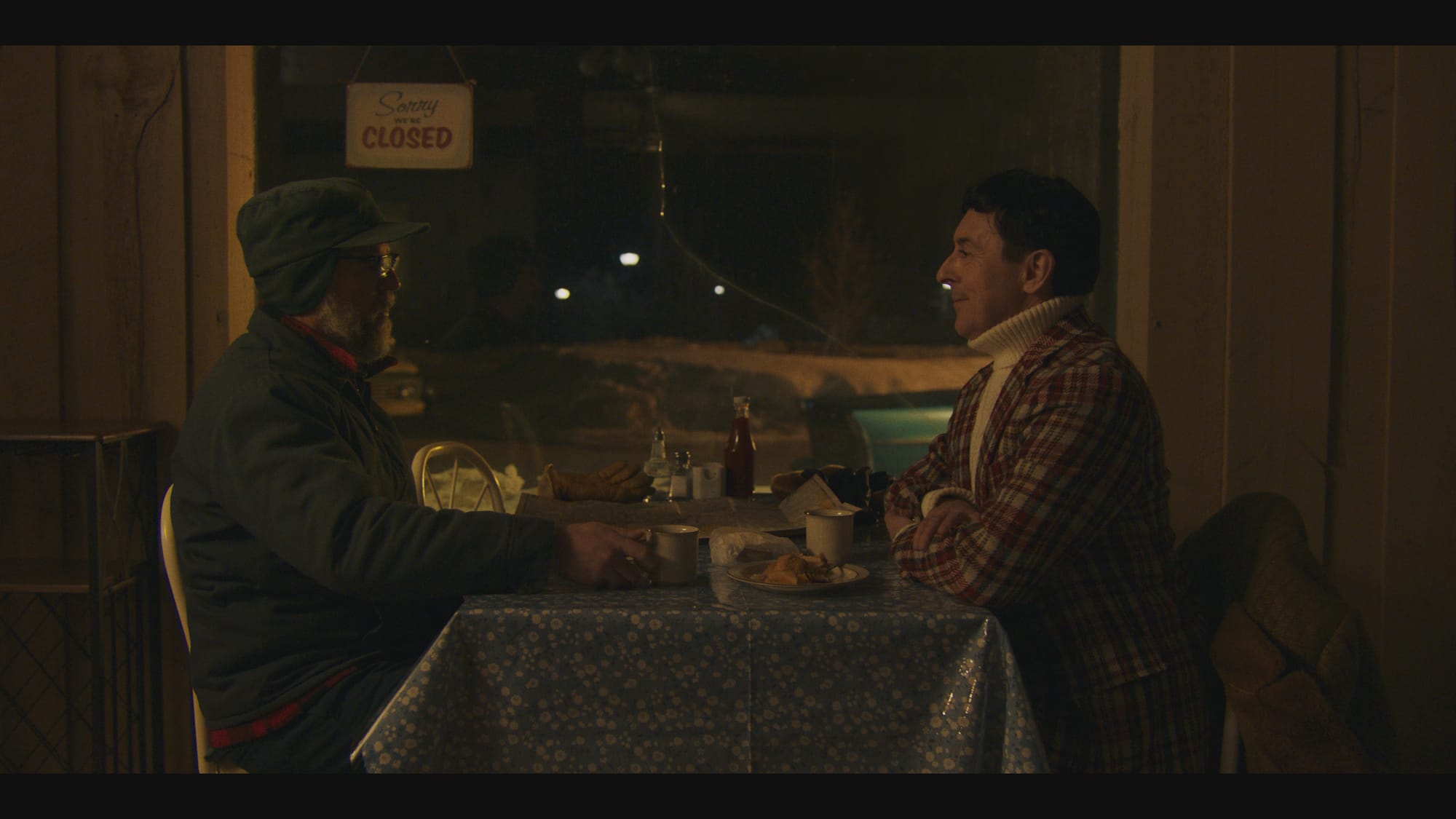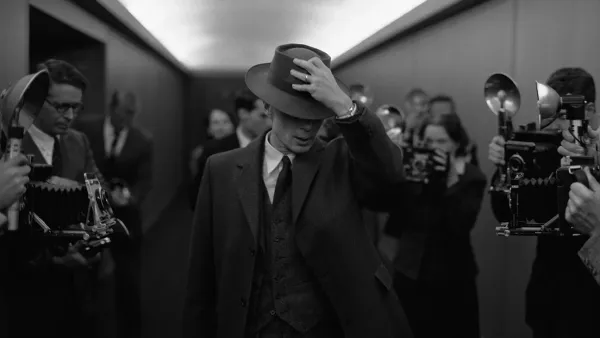Drive Back Home: Unspoken Language
Alan Cumming's new feature outing is a heartbreaking, heartwarming film that takes you on a journey in more ways than one...

Drive Back Home opens with a montage of archival footage; angry mobs chanting homophobic slurs, newspaper articles detailing the “troubles of homosexuals haunting public lavatories”, drag queens being pelted with fruit, news anchors reporting that “any homosexual can be put away as a dangerous sexual offender for a lifetime”, and footage of men being defiantly affectionate amidst it all, embracing each other and laughing. Real, visceral footage that brings you right into the world of the film - and then the words “inspired by a true story”. The true story in question is that of Ernie and Hedley Clowater, the grandfather and great uncle of the film’s writer and director, Michael Clowater.
Drive Back Home sets the tale in 1970. In rural New Brunswick, an unassuming plumber named Weldon who goes by “Wid” (Charlie Creed-Miles), gets a call one night telling him his estranged brother Perley (Alan Cumming) has been arrested for having sex with a man in public, and is in jail in Toronto. This means Wid must leave New Brunswick for the first time in his life, making the long and snowy drive to Toronto to get his brother out of jail. But that’s not all - at the behest of his mother Ade (Clare Coulter), he must also bring Perley back home for the first time in years. Wid is very resistant, saying of his brother “if you’ve done something so bad that it caused your own family to turn their backs on you what does that say about you?” To which his mother responds “You’re asking that question the wrong ways round”.
Throughout the film, we see flashes of a repressed and traumatic memory of Wid’s, with each flashback revealing more of the horrifying event. It is never explicitly said if this incident is the “something so bad” Wid is referring to in this early scene, but throughout the course of the film, we witness Wid grappling with confronting this memory, and daring to ask the question the other “ways round”.
The central performances in Drive Back Home are impeccable - Alan Cumming as Perley is at once fiercely self assured, proud of what he has achieved for himself in spite of such abusive and hostile beginnings, unwilling to hide who he is, but also childlike in his vulnerability, his deep desire for understanding and connection. Charlie Creed-Miles is astounding as Wid, utterly believable as a small town man who has lived his whole life in the same place, and totally selling the journey of understanding that Wid embarks on as he rethinks the world and his place in it anew. Clare Coulter turns in a remarkable performance as their mother Ade, conveying such a sense of deep love and a yearning to put her broken family back together, yet also providing some of the film’s funniest moments with her gruff, no nonsense attitude.

Language holds much importance in Drive Back Home, both in the literal and metaphysical sense. Wid drives an extra long route from New Brunswick to Toronto in order to avoid Quebec, purely because he is anxious about the fact he does not speak French. When he tells Perley this, Perley responds that they can drive home through Quebec as he himself speaks French, having spent five years living in Montreal. Wid seems totally unaware of this chapter of his brother’s life, let alone that Perley can fluently speak a second language. At one point, they run into car trouble and knock on the door of a French speaking local to ask for help. Perley leads the conversation in French, with Wid utterly shut out, but when the stranger learns Wid is a plumber, he takes Wid off to show him a blocked pipe in the barn, leaving his brother behind - they have found they speak a language that Perley does not. Safe in this shared, unspoken common language of plumbing, Wid speaks frankly for the first time about his brother, knowing the stranger cannot understand what he’s saying.
We see another unspoken language shared by Perley and a young gay man in a bar, and in the ways Perley speaks of being institutionally discriminated against for his sexuality. Wid incredulously asks if Perley told the institution in question about his sexuality, and Perley replies that of course he didn’t tell them - the implication being, they just knew. Simply by existing as himself in the world, Perley is always communicating in an unspoken language, and never knows whether those translating it are friends or foes.
The film ends with a dedication to Ernie and Hedley, accompanied by a picture of the two of them as old men, smiling at the camera. When we think of how many queer elders’ stories died with them, those who were never safe enough to tell those stories, or of how many were robbed of becoming an elder at all, it is especially beautiful to see a film based on the true story of a queer man in the 1950s. A story which was passed down through a family rather than covered up, and used as inspiration for such a lovingly made, empathetic film. I absolutely loved it.




